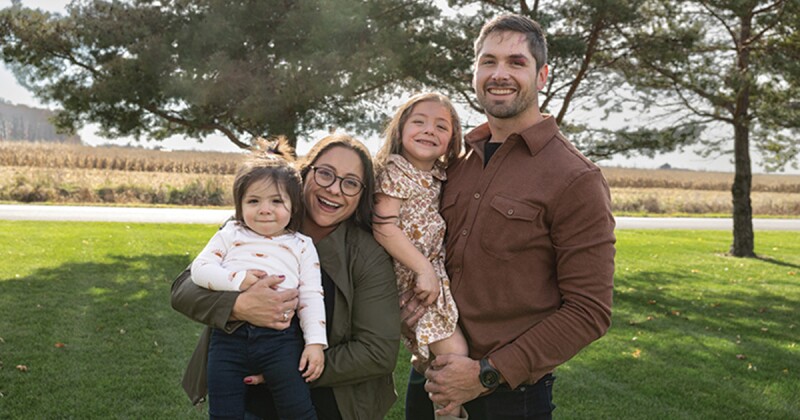“How will your decisions today impact your family 100 years from now?”
It’s a question that Thrivent Financial Advisor Brock Howard of Gateway Financial Group in St. Louis often asks his clients. Their answer can unlock a key concept in financial planning:
“The decisions we make in our personal lives will impact those we care about, both born and unborn,” Howard says. “If I’m a wise steward of my money and faithful with what I’m blessed with, I have the ability to bless others for 100 years.”
Assets that endure
“It’s something you can give your kids and, God-willing, your grandkids, to have the opportunity to do things they wouldn’t be able to do without your assistance—the opportunity to take risks,” says Brandon, of Hazelwood, Missouri.
Brandon’s parents were blue-collar workers who didn’t attend college and were unable to pay for his education or help him financially after he graduated. Brandon bundled scholarships and worked part-time during the year and full-time in the summers to put himself through college. He always had to work hard at jobs that paid the bills—whether or not the work aligned with his career goals or personal values.
“I never thought, ‘Do I like my job? Do I like my boss?’ I was worried about whether I could eat,” he says.
Brandon already can see the impact of generational wealth on his three adult children, including his son who recently graduated with a degree in chemical engineering.
“Because his mother and I have accumulated some wealth and financial backing, it gives him the opportunity to graduate from school and not have to take a job just for the income,” Brandon says. “He can take a job that says: ‘This is something I’ve been trained to do, and I really enjoy doing’ without worrying if he’s able to support himself.”
Although Brandon and his wife Dorothy don’t have grandchildren yet, they already are planning for that possibility. They intend to leave their grandchildren enough money so that they can pursue an education without worrying about loans and graduate debt-free.
“It’s a blessing for our kids and grandchildren,” he says. “Our kids can continue building generational wealth.”
A legacy of knowledge
Brandon and Dorothy are generous not only with their assets, but also with the knowledge that helped them build generational wealth. The couple co-wrote a book, Finally Making Money, along with a companion workbook that offers money management tools designed for working-class people who grew up poor. They teach financial literacy workshops at their church and lead a ministry called “Investing in Peoples,” which makes home ownership more accessible. The organization buys and renovates homes in disrepair, then sells them at affordable prices.
Brandon believes home ownership is a foundation for generational wealth. A home is an asset that can appreciate over time, increasing in value while its owners build equity and financial freedom. It’s also an asset that can be passed on to future generations.
Financial knowledge is essential to building generational wealth—and it also helps preserve it from one generation to the next. Howard encourages his clients to have frequent, positive, open conversations with their children about money. That includes sharing their own financial habits, both good and bad.
According to a recent Family Financial Foundations survey by Thrivent,* only about one-quarter of adults said they had frequent, direct conversations with their parents or guardians about financial topics when they were growing up. In the same survey, people cited parents and guardians as their primary source for learning about how to save and manage their money.
“Generational wealth is best accomplished with conversations,” Howard says. “So many [young adults] head to their first career and make a ton of mistakes. If you give your child financial sense, their likelihood to be successful is much higher.”

Family values
Emilia Gutierrez’s grandmother, who came to Michigan as a migrant farm worker, didn’t have much material wealth to leave to her family. But she passed on something enduring: a deep, abiding value of caring for her community.
“She always made room for people,” says Emilia, a Thrivent client in Essexville, Michigan. “If someone needed a meal and a warm smile, she made room at the table. If someone needed an in-between spot, a warm place to sleep, she opened her home.”
Emilia’s grandmother is remembered for her faith, generosity and her cooking. She bought a house down the street from the Catholic church so that she would never need anyone to drive her to Mass, which she attended multiple times a week. Her kitchen always was stocked with fresh tortillas, ready to wrap into burritos for anyone who stopped by. She volunteered for a resource pantry for migrant workers, long after she had moved on from the sugar beet fields.
Today, Emilia is president of a nonprofit, Do-All Inc., which provides employment services to adults with mental illness and disabilities. She and her husband Ben have two daughters, ages 1 and 4. With guidance from their Thrivent financial advisor Paul Gaiser, they set up a financial plan that includes tax-advantaged retirement accounts, income protection and juvenile life insurance policies the girls can carry through their lives.
“My hope for the girls is that they start their adult lives on strong financial footing,” Emilia says. “I want them to start with education and resources to make choices that align with their own values and not be limited by constraints of debt, fear of money or fear of the financial world in general. They can make decisions with confidence as they start their individual lives—whatever they want that life to look like.”
Emilia and Ben already have begun teaching their daughters about money and the
“When you have what you need, build a longer table, not a higher fence,” she says. “That is everything I want to live by and teach my girls to live by.”
Money passed on without a plan becomes a burden, not a blessing,
An intentional legacy
As a senior charitable gift planner with
Boline, a former estate planning attorney, often partners with financial advisors whose clients are considering how to transfer their wealth. For many clients, their primary goal is to pass on assets to family members. Charitable giving can provide tax efficiency, maximizing the amount given to beloved people and causes while helping to reduce the amount due to the IRS. A charitable giving strategy is also a way to pass along family values, in addition to wealth.
“I often have conversations with donors who want to bring in their kids and grandkids on charitable decisions,” Boline says. “They don’t want to just pass on dollars but values of generosity.”
“A lot of families realize they have been blessed and want to share those blessings with the world,” Boline says.
Boline considers himself a creative problem solver at finding ways for people to achieve their financial and generosity goals in tax-efficient ways. Charitable gift annuities and trusts can make it easier for people to pass along highly appreciated assets such as property and securities, which would otherwise be heavily taxed. He recalls one client, a farmer, whom he helped to support a church capital campaign with a donation of several dozen hogs.
He also works with clients who have received an inheritance from a family member and want to honor that person’s memory in a meaningful way. Thrivent Charitable has a grants team that can help with the process of researching charities and discerning where and how to direct the gift for maximum impact.
Scholarship funds are another way of continuing a legacy and can be particularly meaningful for honoring people who had a strong personal connection to their career or alma mater. For example, a scholarship in memory of a teacher might be designated for students who attend his or her school and plan to study education.
However, the best way to pass along generational values with wealth is to have open, honest discussions with loved ones about what matters most to you.
“Money passed on without a plan becomes a burden, not a blessing,” Howard says. “Talk about generational wealth in the perspective of your family’s story. If you can pass on that story, it’s going to create a much better story for everyone.”
2023 at a glance




5 tips for building, sustaining and passing on generational wealth
- Talk about family values. What stories have you heard about your grandparents, great-grandparents or other relatives? What wishes do you have for future generations? Storytelling is a powerful way to carry on values from one generation to the next.
- Have a financial plan. A comprehensive financial plan should include short- and long-term goals, as well as the steps needed to get there. A Thrivent financial advisor can help you create a plan that considers your values and goals for current and future generations of your family.
- Protect your assets. Don’t risk an accident or major medical event derailing all that you have built for future generations. Ensure that your financial plan includes the appropriate insurance to protect your family’s future.
- Consider tax efficiency. When you think of who will be blessed by your generational wealth, you probably aren’t including the IRS in your vision. Tax-advantaged accounts and charitable giving products can help you maximize the assets you’re able to give to the people and causes you care about.
- Teach your children well. Good financial habits start early. Teach your children the basics of budgeting and saving when they are young, and make sure they understand concepts such as credit and investing by the time they are earning their first paychecks. Reinforce their roles as stewards of your family’s wealth for future generations.







